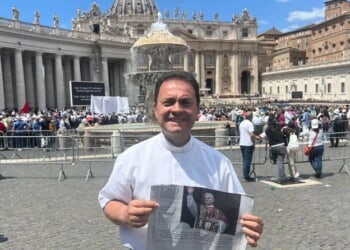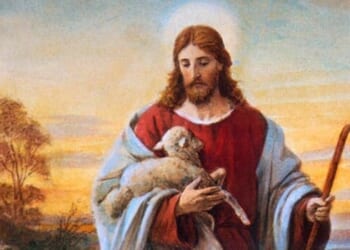We live in an age in which the debate on euthanasia is becoming increasingly heated and widespread in Europe and around the world. It is therefore essential and urgent to reaffirm the values of Catholic doctrine concerning the dignity of human life, the nature of death, and the meaning of Christian hope.
Contemporary culture, often influenced by materialistic and individualistic views, tends to see death as an enemy to be defeated at all costs, promoting the idea of a “sweet death” as a form of absolute self-determination. However, according to the Catholic Faith, death is not a mere biological event, but a passage to eternity, a moment of encounter with God that must be lived with hope, a virtue that opens us to the deepest meaning of existence.
We address this compelling issue by presenting some reflections on this topic by Fr. Francesco Giordano, director of the Roman office of Human Life International.
The Church’s Teachings and the Meaning of Suffering
As Monsignor Ignacio Barreiro Carámbula and other authoritative Catholic thinkers have repeatedly stated, “Death is only good when it is holy.” This statement emphasizes that Christian death, even in its most painful forms, has a redemptive value. The cross and the crucifix are at the heart of the Faith because they teach us to accept, live, and offer suffering as a gift that unites the human and the divine. Suffering, though painful, becomes an instrument of perfection and participation in the Passion of Christ. As St. Paul says in Colossians 1:24: “In my flesh I am filling up what is lacking in the afflictions of Christ on behalf of his body.”
From this perspective, suffering is never wasted, but rather becomes a path of meaning and hope that allows us to draw closer to the fullness of eternal life.
On the contrary, atheistic or materialistic thinking tends to consider death as the ultimate end, eliminating any spiritual or transcendental dimension. “Sweet death” (in Ancient Greek eu means “good” and thanatos means “death,” so together euthanasia means “sweet death”) is presented as a way to avoid pain. This view denies the value of suffering as an integral part of the Christian life. The materialistic view, in fact, does not transcend matter, but reduces it to an illusion. This is evident in the transhumanists’ attempts to return to life after many years through techniques such as hibernation. The Christian Faith, on the other hand, believes that humans are composed of body and soul, and that earthly life is a journey toward eternity, where the soul will be reunited with its body in the final judgment.
Death as a Transition and Hope in Eternal Life
For Catholics, death is not the end, but rather a transition. They do not view cemeteries as necropolises, but rather as places of rest awaiting resurrection. Christian hope is based on Jesus Christ’s promise that He conquered death and opened the gates of Heaven to us. Creation, good and whole, testifies that everything God has created is destined for fulfillment in eternity. Humans have immortal souls, and their true place is in the spiritual world.
This view differs radically from that of the atheist, who sees death as the definitive end. Faith invites us to live with the awareness that our destiny is not in nothingness, but in the encounter with God, who gives meaning to suffering and to life itself. Christian hope sustains us in difficult moments, reminding us that evil and suffering have meaning within a greater plan, that of salvation.
Philosopher Peter Kreeft says that hell is not so much a matter of pain. Hell, more than pain, has to do with a lack of meaning. If you take away the meaning of life, you also lose hope, and you enter a vortex of randomness and existential emptiness. The lack of hope leads to a condition of total loss of meaning and perspective, which can lead to spiritual hell. The Christian Faith teaches us that “everything has a meaning beyond itself” and that hope is based on the certainty of an encounter with God, who gives meaning even to the greatest sufferings.
Euthanasia Contradicts Hope and Human Dignity
The euthanasia debate falls within this framework of values. Promoting the idea that individuals can decide when to die calls into question the value of life as a gift from God, instead portraying it as an absolute right.
Today’s culture, with its emphasis on absolute freedom and self-determination, risks falling into the mistaken belief that we have the power to decide about life. This mentality recalls the myth of Prometheus as well as Lucifer’s rebellion, which opposes the divine order and God’s wisdom. The proposal of early “end of life,” often supported by economic and political interests, empties human life of meaning and denies Christian hope.
On the other hand, the Christian Faith invites us to rediscover the value of hope, which is based on faith in God and trust in His plan of salvation. Hope is not an illusion, but a theological virtue that enables us to face suffering with courage, knowing that God accompanies us and guides us towards eternal life. Therefore, death becomes a meaningful passage, not a definitive exit.
The Challenge of Hope and Faith
The comparison between the Catholic and materialistic views on death and euthanasia calls us to the responsibility of living with hope, love, and faith, and to appreciate and rediscover the value of life and hope, even in difficult situations. As St. Thomas Aquinas explains, hope must believe in something future, something based on faith, which believes that there will be an encounter with God. This is hope at the theological level. The future is built on trust in God, love for life, and a commitment to promoting a culture of life.
Euthanasia, in its opposition to human dignity and Christian hope, challenges us to rediscover the profound meaning of suffering and death as stages on the path to salvation. Only by keeping hope in Christ alive can we face the challenges of the modern world, bear witness to the beauty of life, and live with the awareness that, in God, everything has meaning and everything is fulfilled in eternal love.
Photo by Richard Schramm on Adobe Stock














